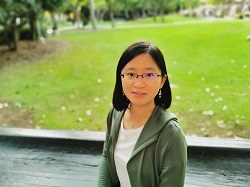- Speaker
- Dr. Tian-Han Liu
- University of California-Los Angeles
- Abstract
Chirality-induced spin selectivity (CISS) is an effect in which structural chirality engenders spin polarization in the electrical current from a nonmagnetic electrode. This phenomenon has profound fundamental implications on the intricate interplay between structural chirality, electron motion, and spin polarization. The spin-valve effect and the Hanle effect are two main electrical approaches to study spin transport in molecular junctions. First, we fabricated junctions of (Ga,Mn)As/alpha-helix polyalanines (AHPA-L)/Au[1]. We quantitatively analyzed the spin-valve effect by measuring the magnetoconductance. The use of a ferromagnetic semiconductor facilitated a reliable examination of its bias dependences. The experiment provided definitive evidence for a nontrivial linear-response component in the spin-valve effect. We further resolved the fundamental mechanism how chiral geometry influences the electronic spin, by unambiguously identifying the origin of necessary spin-orbit coupling (SOC). We compared the Au and Al electrodes and found qualitative differences, demonstrating the essential role of electrode SOC[2].Next, the Hanle effect was examined in junctions of GaAs/AHPA-L/Au. Our results showed the suppression of spin accumulation by a transverse magnetic field. The Hanle signals in the GaAs:Si/AHPA-L/Au junctions were found to exhibit universal temperature and bias current dependences with high degrees of consistency. We will present quantitative analysis of the experimental results and discuss their implications on the physical origin of CISS. Our work suggests a new scheme of semiconductor spintronics free of any magnetic materials based on the CISS effect.
References
[1] T. Liu, X. Wang, H. Wang, G. Shi, F. Gao, H. Feng, H. Deng, L. Hu, E. Lochner, P. Schlottmann, S. von Molnar, Y. Li, J. Zhao, P. Xiong, "Linear and Nonlinear Two-Terminal Spin-Valve Effect from Chirality-Induced Spin Selectivity", ACS Nano 2020, 14: 15983.
[2] Y. Adhikari*, T. Liu*, H. Wang, Z. Hua, H. Liu, E. Lochner, P. Schlottmann, B. Yan, J. Zhao, P. Xiong, "Interplay of Structural Chirality, Electron Spin and Topological Orbital in Chiral Molecular Spin Valves", arXiv: 2209.08117.
- About the Speaker
Tianhan Liu is currently a postdoctoral scholar in Prof. Paul Weiss Lab in Department of Chemistry and Biochemistry at University of California, Los Angeles. She got her bachelor’s degree in physics from Xiamen University in China in 2014 and doctoral degree in condensed matter physics from Florida State University in 2021. Her PhD research focused on spin transport in quantum devices and she mainly studied chirality-induced spin selectivity (CISS) in hybrid semiconductor/molecular devices, which offers a potential way to realizing spin injection into semiconductors without using magnetic materials. She is now taking an interdisciplinary approach to study chiral related quantum effects in hybrid systems.
Besides creative research, she is actively involved in a variety of education and outreach activities. Outside of science, she likes hot yoga, writing, and gardening.
- Date&Time
- 2023-07-06 2:00 PM
- Location
- Room: A303 Meeting Room




